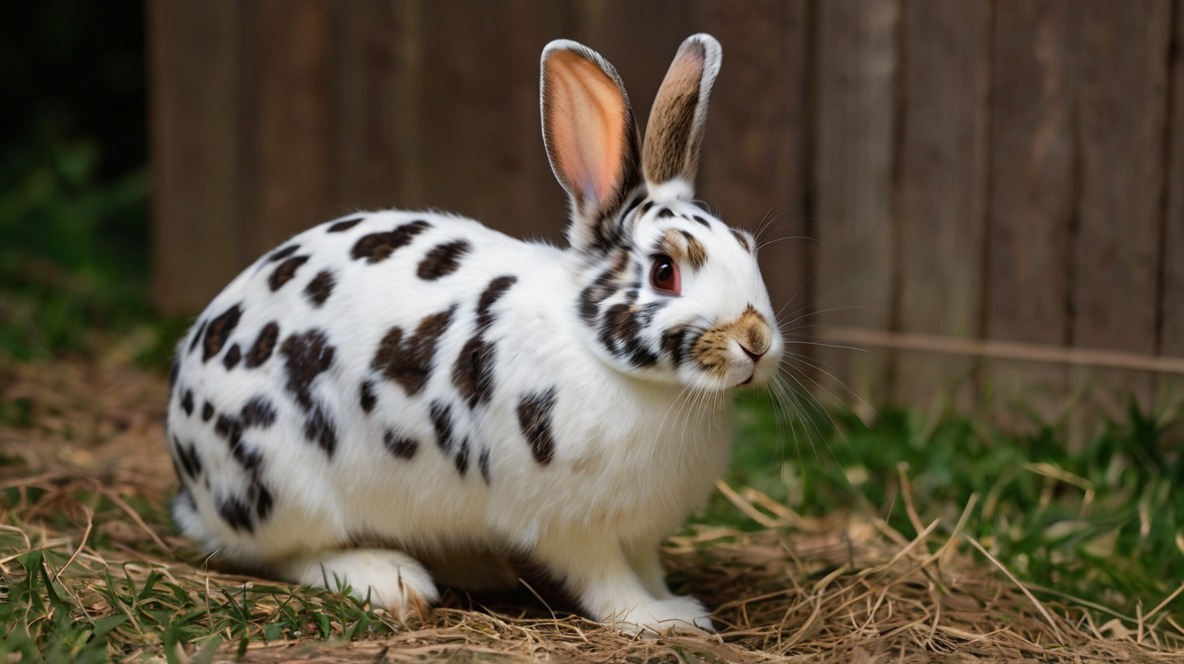When caring for an English Spot Rabbit, creating a nurturing and comfortable environment ensures they live a happy and healthy life. These adorable, spotted rabbits are not just pets; they’re family members who thrive on love, attention, and proper care. In this guide, we’ll dive into everything you need to know about creating the perfect home for your English Spot Rabbit.
Table of Contents
Understanding the English Spot Rabbit
English Spot Rabbits are known for their distinctive markings and friendly personalities. They’re social creatures who love interacting with their owners and exploring their surroundings. English Spots are active and curious, unlike some other rabbit breeds, making them a delightful addition to any home.
These rabbits typically weigh between 5-8 pounds and have a lifespan of around 5-9 years, though with excellent care, they can live even longer. Their unique personality traits include affectionate, intelligent, and often quite playful. However, they have specific needs that must be met to keep them healthy and content.

Choosing the Right Living Space
When deciding where your English Spot Rabbit will live, you have two primary options: indoors or outdoors. Each has its pros and cons, but ultimately, the decision should be based on what’s best for your rabbit’s health and happiness.
- Indoor Living: Many rabbit owners prefer keeping their pets indoors, where they can closely monitor their health and behavior. Indoor rabbits are also safer from predators and extreme weather conditions.
- Outdoor Living: If you choose to house your rabbit outdoors, ensure they have a secure, weather-proof hutch with plenty of room to move around. Outdoor rabbits enjoy fresh air and natural sunlight, but they require extra protection from the elements and predators.
Setting Up a Comfortable Habitat
Creating a cozy and secure habitat is crucial. Whether your English Spot lives inside or outside, they need a well-organized space where they can eat, sleep, and play.
- Bedding: Use soft, absorbent bedding such as hay, straw, or shredded paper. This will keep your rabbit warm and comfortable. Change the bedding regularly to maintain cleanliness and prevent odor buildup.
- Temperature and Ventilation: Rabbits are sensitive to extreme temperatures. Their living space should be well-ventilated but free from drafts. The ideal temperature range is between 60-70°F. Avoid placing their habitat in direct sunlight or near heat sources.
Diet and Nutrition for English Spot Rabbits
Diet plays a significant role in the health and longevity of your English Spot Rabbit. A balanced diet consists mainly of hay, fresh vegetables, and high-quality pellets.
- Hay: Timothy hay should make up the majority of your rabbit’s diet. It aids in digestion and keeps their teeth healthy.
- Vegetables: Offer a variety of fresh, leafy greens like romaine lettuce, parsley, and cilantro. Introduce new vegetables gradually to prevent digestive issues.
- Pellets: Provide a small number of high-quality pellets to ensure your rabbit gets essential vitamins and minerals. Avoid overfeeding pellets, as they can lead to obesity.
Foods to Avoid: Never feed your rabbit foods like chocolate, avocados, or anything high in sugar or fat. Also, avoid iceberg lettuce, which has little nutritional value.
Hydration and Water Sources
Hydration is critical for your rabbit’s health. Provide a constant supply of fresh, clean water. Use a sturdy water bottle attached to the side of the cage or a heavy ceramic bowl that won’t tip over easily. Check and refill their water supply daily.
Grooming and Hygiene
English Spot Rabbits are relatively low-maintenance, but they still need regular grooming to stay healthy.
- Grooming: Brush your rabbit weekly to remove loose fur and reduce the risk of hairballs. During shedding seasons, you may need to groom them more frequently.
- Bathing: Rabbits are generally good at keeping themselves clean, so bathing is rarely necessary. If they do get dirty, spot-clean them with a damp cloth.
- Nail Trimming: Trim your rabbit’s nails every 4-6 weeks to prevent overgrowth and injury. If you’re unsure how to do this, ask your vet for guidance.
- Dental Care: Rabbits’ teeth grow continuously, so they need to chew on hay and safe toys to keep them worn down. Regularly check for signs of dental issues, such as drooling or difficulty eating.
Exercise and Playtime
Exercise is vital for the physical and mental well-being of your English Spot Rabbit. Aim to give them at least 3-4 hours of exercise outside of their cage each day.
- Play Areas: Create a safe, enclosed area where your rabbit can hop around and explore. Consider setting up tunnels, ramps, and chew toys to keep them entertained.
- Social Interaction: Rabbits are social animals, so spend time playing with them and let them interact with other pets under supervision. This helps prevent loneliness and keeps them engaged.
Understanding Rabbit Behavior
Rabbits communicate through a variety of behaviors, and understanding these can help you build a stronger bond with your pet.
- Common Behaviors: Thumping, nudging, and circling are all normal rabbit behaviors. Thumping usually indicates fear or annoyance while nudging is a sign of affection or curiosity.
- Signs of Stress: Watch for signs like hiding, excessive grooming, or changes in appetite, as these can indicate stress or discomfort. Address the root causes promptly to keep your rabbit happy.
Health Care and Regular Vet Visits
Regular veterinary care is crucial for keeping your English Spot Rabbit healthy.
- Vet Visits: Schedule annual check-ups with a rabbit-savvy veterinarian. During these visits, your vet will check for common health issues and advise on preventive care.
- Vaccinations: Depending on your location, your rabbit may need vaccinations against diseases like myxomatosis and rabbit hemorrhagic disease (RHD).
- Common Health Issues: Be aware of potential health problems such as respiratory infections, GI stasis, and dental disease. Early detection is key to successful treatment.
Training Your English Spot Rabbit
Training your rabbit can make living together easier and more enjoyable.
- Litter Training: Rabbits can be litter trained much like cats. Start by placing a litter box in their cage and gradually introduce it to other areas of your home.
- Basic Commands: While rabbits aren’t as trainable as dogs, they can learn simple commands like “come” or “no” with patience and positive reinforcement.
- Positive Reinforcement: Reward your rabbit with treats and affection when they exhibit desired behaviors. This will encourage them to repeat these actions.
Socialization and Interaction
Socializing your rabbit is important for their mental health. If you have other pets, introduce them slowly to avoid stress.
- Introducing Other Pets: Supervise all interactions between your rabbit and other pets. Some rabbits can get along well with cats or dogs, but others may not, depending on their personality.
- Human Interaction: Spend time cuddling and talking to your rabbit. This strengthens your bond and helps them feel secure.
Creating a Safe Environment
Rabbits are naturally curious and love to explore, but this can sometimes lead to trouble.
- Rabbit-Proofing: Protect your rabbit from household hazards by covering electrical cords, securing heavy furniture, and keeping toxic plants out of reach.
- Outdoor Exploration: If you allow your rabbit to explore outside, ensure the area is secure and free from predators. Supervise them at all times to prevent escapes.
Seasonal Care Tips
Your rabbit’s care needs may change with the seasons, so it’s important to adjust accordingly.
- Winter Care: Keep your rabbit warm and dry during the winter. If they live outdoors, ensure their hutch is insulated and free from drafts.
- Summer Care: In hot weather, provide plenty of shade and fresh water. Consider placing frozen water bottles in their hutch to help keep them cool.
Conclusion
Caring for an English Spot Rabbit is a rewarding experience that requires dedication and knowledge. By providing a loving environment, a balanced diet, and regular care, you can ensure your rabbit leads a happy and healthy life. Remember, these gentle creatures depend on you for their well-being, so always strive to give them the best possible care.
FAQs
How often should I groom my English Spot Rabbit?
You should groom your English Spot Rabbit at least once a week, and more frequently during shedding seasons.
What should I do if my rabbit refuses to eat?
If your rabbit refuses to eat, consult a vet immediately, as this could be a sign of a serious health issue.
Can English Spot Rabbits live with other pets?
Yes, with proper introduction and supervision, English Spot Rabbits can coexist with other pets but always monitor their interactions.
How do I know if my rabbit is happy?
A happy rabbit will exhibit behaviors like playing, eating well, and being curious about their surroundings.
What are the signs of illness in English Spot Rabbits?
Signs of illness include lethargy, loss of appetite, changes in droppings, and difficulty breathing. If you notice any of these, see a vet promptly.
“Share your rabbit care tips in the comments below”



